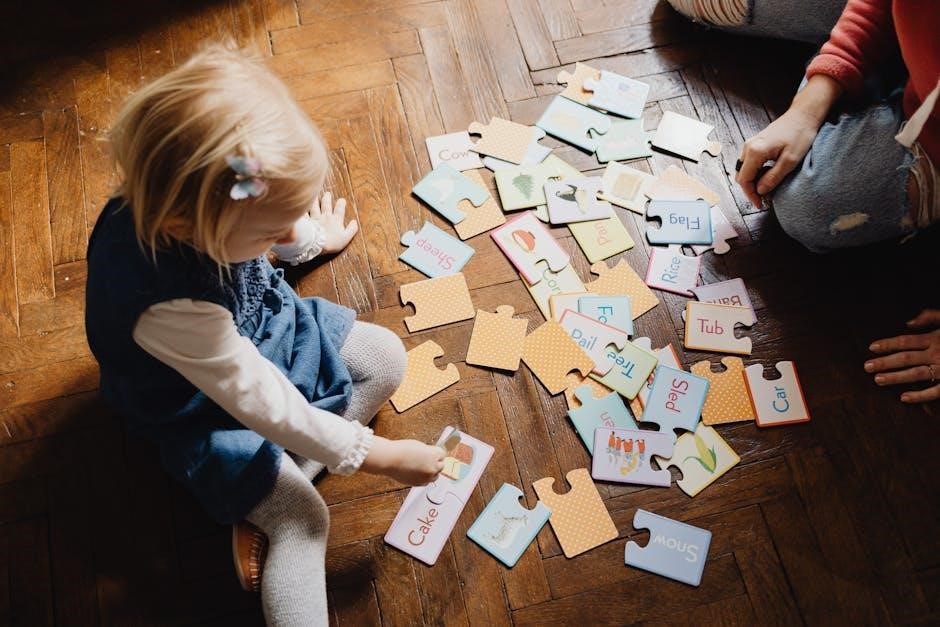Spelling Bee words with definitions and sentences are essential for effective preparation. They help contestants understand meanings, pronounce correctly, and remember spellings. Official dictionaries like Merriam-Webster provide accurate references for both words and sentences.
1.1 Importance of Spelling Bees in Education
Spelling bees play a vital role in education by fostering literacy, critical thinking, and confidence. They encourage students to master spelling, expand vocabulary, and understand word meanings. Competitions like the Scripps National Spelling Bee motivate learners to practice diligently, enhancing their language skills. Spelling bees also promote public speaking and poise, as participants articulate words clearly. By studying word definitions and sentences, students gain a deeper understanding of language structure and usage. These skills are foundational for academic success and lifelong learning. Schools often use study lists, including definitions and sentences, to prepare students effectively. Such practices ensure that spelling bees are not just about memorization but also about fostering a love for language and intellectual growth.
1.2 Benefits of Using Definitions and Sentences in Spelling Practice
Integrating definitions and sentences into spelling practice enhances learning effectiveness. Definitions provide context, helping spellers understand word meanings, which in turn aids in retention. Sentences demonstrate proper usage, reinforcing how words fit into everyday language. This approach goes beyond rote memorization, fostering a deeper connection with vocabulary. Many study guides, like the School Spelling Bee Study List, include definitions and example sentences to enrich practice. Using these resources, learners can associate words with their meanings and usage, improving both spelling accuracy and language comprehension. This method is particularly effective for preparing for competitions, as it mirrors how words are presented in actual spelling bees. By studying words in context, participants build a stronger foundation for mastering challenging vocabulary and excelling in their spelling endeavors.

Preparing for a Spelling Bee
Preparing for a spelling bee involves using study lists with definitions and sentences. Understanding word meanings and proper usage enhances retention. The official 450-word list ensures comprehensive preparation, building confidence for competition.

2.1 Understanding the Spelling Bee Word List
The Spelling Bee Word List is a curated collection of words designed to challenge participants at various skill levels. Typically divided into levels like One Bee, Two Bee, and Three Bee, it includes words ranging from basic to advanced. Definitions and sentences are provided to aid comprehension. The list often includes , such as “manual” and “benevolent,” each with clear definitions and example sentences. This structure helps spellers understand meanings and usage, enhancing retention. Words are organized by difficulty, starting with simpler terms and progressing to more complex ones. Studying this list ensures familiarity with diverse vocabulary, preparing contestants for competition. It is a foundational resource for building spelling and linguistic skills, essential for success in spelling bees.
2.2 How to Study Spelling Bee Words Effectively
To study Spelling Bee words effectively, break down each word into parts, focusing on prefixes, roots, and suffixes; Use mnemonics to create associations or memory aids. Practice regularly, setting aside time daily to review and reinforce learning. Flashcards are a powerful tool, combining the word with its definition and sentence. Digital apps and PDF guides provide interactive and accessible study materials. Group words by category, such as language of origin or meaning, to enhance retention. Test yourself frequently using active recall, a proven method for long-term retention. Consistency is key—spend short periods each day rather than cramming. Start with simpler words and gradually tackle more challenging ones. Track progress and revisit difficult words. Finally, use the official dictionary and study lists to ensure accuracy and familiarity with competition standards.
2.3 The Role of Definitions in Mastering Spelling
Definitions play a crucial role in mastering Spelling Bee words by connecting spellings to meanings, enhancing memory retention, and improving comprehension. Contestants often use definitions to understand context, aiding in recalling spellings. Definitions also clarify nuances, reducing confusion between similar words. Study lists, including those from Scripps National Spelling Bee, provide definitions and sentences, making learning structured. Using these materials helps spellers recognize patterns and relationships between words. Regularly reviewing definitions strengthens mental associations, essential for quick recall during competitions. This approach ensures that spellers not only know the spelling but also understand the word’s usage, making their practice more effective and comprehensive. Definitions are a cornerstone of successful Spelling Bee preparation, bridging the gap between memorization and true mastery of the words.

Core Content of Spelling Bee Words with Definitions and Sentences
The core content of Spelling Bee materials typically includes a structured list of words categorized by difficulty levels, such as beginner, intermediate, and advanced. Each word is accompanied by its definition, pronunciation, and an example sentence to illustrate its usage. These resources, often available in PDF formats, are designed to help participants build a strong foundation in spelling and vocabulary. The words are carefully selected to cover a wide range of topics, ensuring broad exposure to diverse linguistic elements. Definitions and sentences are integral to understanding context, which aids in retaining spellings and meanings. Official study lists, such as those from the Scripps National Spelling Bee, often include 450+ words, providing a comprehensive guide for preparation. Additional resources like flashcards and pronunciation guides further enhance learning. This organized approach ensures spellers can systematically master words, making practice efficient and effective.
3.1 Beginner-Level Spelling Bee Words
Beginner-level Spelling Bee words are designed to introduce young spellers to foundational vocabulary. These words are typically common, everyday terms that build a strong base for future learning. For example, words like manual (adjective: designed for use with the hands) or objection (noun: a statement expressing disagreement) are often included. Each word is paired with a clear definition and a simple sentence, such as: “The teacher asked for an objection to the proposal.” This approach helps spellers understand both the spelling and the meaning. Study lists, like the 450-word School Spelling Bee Study List, include these beginner words to ensure mastery. By learning these words, spellers gain confidence and a solid understanding of basic vocabulary, preparing them for more challenging levels. This foundational step is crucial for long-term success in spelling competitions.
3.2 Intermediate-Level Spelling Bee Words
Intermediate-level Spelling Bee words are designed to challenge spellers who have mastered the basics. These words often involve more complex spellings and meanings, such as luxurious (adjective: rich, comfortable, or extravagant) or promise (noun: a statement that you will do or not do something). Study lists, like the School Spelling Bee Study List, include words like uproar (noun: a loud, disorderly noise) and Wednesday (noun: the fourth day of the week). Each word is paired with a definition and a sentence, such as: “The room was filled with an uproar when the announcement was made.” These resources help spellers not only memorize spellings but also understand usage. Intermediate-level words introduce spellers to prefixes, suffixes, and word origins, preparing them for more advanced challenges. Regular practice with these words ensures a smooth transition to higher difficulty levels in spelling competitions.
3.3 Advanced-Level Spelling Bee Words
Advanced-level Spelling Bee words are challenging and require a deep understanding of language nuances. These words, often found in the “Words of the Champions” lists, include terms like benevolent (adjective: kind and generous) and bequeath (verb: to leave something to someone in a will). They frequently come from diverse linguistic origins, such as Latin or Greek, adding complexity. For example, archaeologist (noun: a person who studies past cultures) combines Greek roots. These words are designed to test not only spelling accuracy but also comprehension of meanings and contexts. Spellers must study diligently, using resources like the Scripps National Spelling Bee dictionary, to master these terms. Advanced-level words often appear in higher competitions, making them crucial for serious participants aiming to excel; Practice with flashcards and mnemonics can help retain these challenging spellings and definitions effectively. These words are the pinnacle of Spelling Bee preparation, demanding both skill and dedication.
Tips for Success in a Spelling Bee
- Practice regularly with flashcards and word lists.
- Use mnemonics to remember complex spellings.
- Study word origins and definitions for context.
- Listen carefully to pronounced words and sentences.
- Stay calm and focused during the competition.
4.1 Practicing with Flashcards
Flashcards are a powerful tool for mastering Spelling Bee words. By writing the word on one side and its definition and sentence on the other, learners can test their knowledge effectively. Regular review of these cards helps build familiarity and retention. Many Spelling Bee study guides, such as the official Scripps National Spelling Bee list, include flashcard-friendly formats. Contestants often use flashcards to practice high-frequency words and challenging spellings. This method allows for quick recall practice, which mimics the fast-paced environment of a competition. Additionally, flashcards can be customized to include pronunciation guides or word origins, further enhancing understanding. Consistent practice with flashcards is proven to improve spelling accuracy and confidence, making it a cornerstone of successful Spelling Bee preparation.
4.2 Using Mnemonics for Better Retention
Mnemonics are memory aids that enhance retention of Spelling Bee words. Techniques include associating words with personal experiences, creating mental images, or using acronyms. For example, breaking down complex words into smaller parts and linking them to memorable cues can simplify learning. Mnemonics help spellers recall words more effectively during competitions. Flashcards with mnemonics are particularly useful, as they provide visual and contextual reminders. Many competitors also use rhymes or stories to remember tricky spellings. For instance, associating a word with a personal story or a vivid image can make it easier to recall under pressure. Mnemonics are especially helpful for words with unusual spellings or silent letters. By creating a mental connection, spellers can retain words long-term and retrieve them quickly during the competition. This method is widely recommended in Spelling Bee study guides and is proven to boost confidence and accuracy.
4.3 Leveraging Spelling Bee PDF Guides
Spelling Bee PDF guides are invaluable resources for competitors, offering comprehensive lists of words, definitions, and example sentences. These guides often include tips for effective study habits and strategies to master challenging spellings. Many PDFs are organized by difficulty level, such as beginner, intermediate, and advanced, allowing spellers to progress systematically. They also provide insights into word origins and parts of speech, which can aid in understanding and retention. Additionally, some guides include interactive elements like flashcards or pronunciation guides. By utilizing these PDF resources, spellers can access structured study materials that cover a wide range of words. These guides are particularly useful for those preparing for school or national competitions, as they often align with official word lists. Regular practice with these materials can significantly improve spelling accuracy and confidence, making them a cornerstone of successful Spelling Bee preparation.
